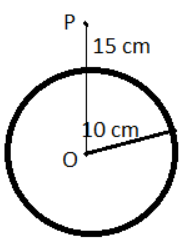Question
Question: In a charged spherical conductor of radius \(10\,cm\) has a potential \(V\) from its center, then th...
In a charged spherical conductor of radius 10cm has a potential V from its center, then the potential at a point 15cm away from the center will be then
A. 3V
B. 23V
C. 32V
D. 31V
Solution
Here, we will calculate the potential both at a distance of 10cm and 15cm from the center of the sphere. We will divide both the potentials to calculate the potential at a distance of 15cm from the center of the sphere. Here, we will take the potential that 15cm away from the sphere as V′ .
Formula used:
The formula used for calculating potential at any point is given by
V=RkQ
Where, V is the potential, k is the coulomb’s constant, Q is the charge, and R is the distance of the charge from any point.
Complete step by step answer:
Consider a spherical conductor of radius 10cm having a potential V at a distance of 10cm from the center, which is as shown below

Here, P is the point at a distance of 15cm from the center where the electric potential V is to be calculated.
Therefore, the radius of the sphere, R=10cm
The distance of the point P from the center, r=15cm
Now, potential V can be calculated by using the following formula
V=RkQ
Therefore, the potential V from the center of the sphere is given by
V=RkQ
⇒V=10kQ
Now, the potential at the point P will be taken as V′ . therefore, the potential at a distance r is given by
V′=rkQ
⇒V′=15kQ
Now, dividing V by V′ , we get
V′V=15kQ10kQ
V′V=10kQ×kQ15
⇒V′V=1015
⇒V′V=23
⇒V′=32V
Therefore, the potential at a point 15cm away from the center of the sphere is 32V.
Hence, option (C) is the correct option.
So, the correct answer is “Option C”.
Note:
The terms potential and Electric potential are different from each other. Potential is defined as the ability of an object to do something. On the other hand, an electric potential is defined as the amount of work done that is needed to displace a charge from the reference point to a specific point without producing any acceleration.
